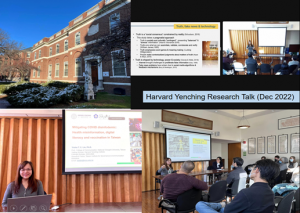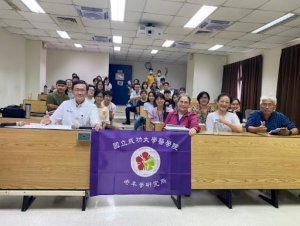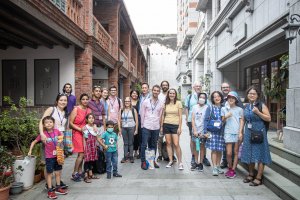For the 2017-18 academic year, my alma mater, Western Kentucky University (WKU), hosted a Taiwanese Foreign Language Teaching Assistant (FLTA) to help tutor students currently studying Mandarin Chinese in the university’s Chinese Flagship Program. As a recent graduate of that program, I thought it was an interesting coincidence that the two of us essentially switched places—she went to WKU and I came to Taipei. The FLTA was named Pia Lin. She also happened to be the co-founder of The World In Your Classroom (TWIYC), a non-profit organization that provides foreigners living in or visiting Taiwan the opportunity to share information about their home country with Taiwanese students by guest lecturing at local middle and high schools.
Around March, Pia contacted me to ask if I would be interested in volunteering as a guest lecturer for TWIYC. After reading about TWIYC and their work, I figured this would be a great opportunity to share a piece of my home, the great Commonwealth of Kentucky—a place most Taiwanese people know very little about, compared to U.S. cities like New York and Los Angeles—with students.
On April 28th, I attended the second of two training days held at National Taiwan Normal University for TWIYC guest lecturers. The purpose of the training days is to paint a clearer picture for guest lecturers of the task at hand, as well as to provide some tips on how to better prepare for the lecture. When Tim Chen, who is also a TWYIC co-founder, was speaking to all of the guest lecturers in attendance, he provided some tips for getting students more engaged, and one in particular stuck out in my mind: find something to which the students can relate.
I instantly thought of my experience studying Mandarin. If I show the kids that I, as a native English speaker, can speak Mandarin fluently after having studied it for only four years and somehow incorporate my experiences studying it into my lecture, perhaps there’s a higher change they will engage and walk away from the lecture with a newfound motivation toward their English studies.
May 6th arrived and it was time to give my lecture at Chenggong High School (成功高中), an all-boys school located in the Zhongzheng District of Taipei. Jenny Huang, an English teacher at the school, met me at the front gate and gave me a quick tour of the school. According to Ms. Huang, Chenggong’s campus (which is rectangular in shape with basketball courts and a running track in the middle, surrounded by classrooms on all four sides) is relatively small compared to other schools in Taipei. I graduated from a high school in small-town Kentucky that had slightly over 1,000 students across grades 9-12, and the size of its campus is about the size of the inner part of Chenggong’s. Needless to say, I was surprised that their campus is considered small.
On our way upstairs to the classrooms, Ms. Huang informed me that many of the students focus their studies in STEM fields. I noticed that many of the classrooms had knots with red and green stuffed pyramid-shaped things hanging outside the doorways. The knots, Ms. Huang said, are for good luck, as the upperclassmen were preparing to take their SATs at the end of the week. I would later learn these “knots” are simply called 粽子 (zongzi, the name of a pyramid-shaped dumpling with a sweet or savory filling inside sticky rice that is wrapped in bamboo leaves). The character 粽 sounds somewhat similar to the character 中 (zhong), and both characters can be used after 包 (bao). The phrase 包粽 means to make zongzi, whereas 包中 means to have the ability to achieve a given feat. In the students’ case, this would be getting a good score on their SATs. Hence, it is tradition to hang these 粽子 outside the classroom during important testing periods to encourage students to do their best on exams.
That morning, I gave my 50-minute lecture to two separate classes. Ms. Huang briefly introduced me, then I started off with a basic self-introduction in Mandarin, stating my Chinese name, where I’m from, how long I studied Mandarin, and what my hobbies are. Many of the students were shocked to hear fluent Mandarin come out of a white person’s mouth. However, the next sentence quickly crushed any dreams the students may have had of the lecture being conducted in Mandarin: “雖然我會講國語,但是今天我會用英文,你們也要用英文提問題.” (“Even though I can speak Mandarin, I’ll be using English today. I ask that all of you use English when asking questions.”)
To start things off, I asked each class if they had ever heard of Kentucky. Out of around 60 students, only one had ever heard of it. It was an exciting feeling to realize I would be introducing my home state to almost all of these students for the very first time. In order to keep their interest, I decided not to delve deep into history and politics, but rather, focus on topics such as food, famous Kentuckians, and sports—particularly because Kentucky is so foreign to most Taiwanese people.
After starting with some basic facts about the Bluegrass State (e.g., state population, climate, the fact it has two time zones), I mentioned a handful of famous Kentuckians the students would likely recognize, including Muhammed Ali, George Clooney, Johnny Depp, Jennifer Lawrence, and Josh Hutcherson. One person in particular was immediately recognized by the students with some laughter: Colonel Sanders—who is commonly referred to as 肯德基爺爺 (“KFC Grandpa”) in Taiwan.
From there, I segued into introducing some Kentucky specialties, such as the infamous KFC, along with bourbon, Louisville Slugger baseball bats, Corvettes, and thoroughbreds. Bluegrass music also has its roots in Kentucky, so I shared a video of current Kentucky House Minority Leader, Rocky Adkins, playing a rendition of the Foggy Mountain Boys’ “Roll In My Sweet Baby’s Arms” with a bluegrass group called Kentucky Wild Horse.
Sports were the next topic of discussion. Taiwanese people and Kentuckians share a love for watching basketball, although NBA is more popular in Taiwan, whereas Kentuckians prefer college basketball. American football, baseball, and horse racing are also popular in Kentucky. The Kentucky Derby was held on the Saturday prior to my lecture, so I figured it would be the perfect opportunity to introduce the students to the Derby, as well as some festivities that revolve around it (such as Thunder Over Louisville, the world’s largest fireworks display).
Following sports, I introduced some food and beverages that are either unique to the Commonwealth or commonly eaten there. These include the Kentucky hot brown, Ale-8 soda, beer cheese, biscuits and gravy, chess pie, and sweet tea (I told the students to imagine 古早味紅茶 [Taiwanese sweet tea] that is two times sweeter than one at regular sweetness; many of them seemed disgusted by how saccharine it sounded). As someone interested in sustainable agriculture, I thought it appropriate to mention a few fruits and nuts that are grown in Kentucky, but not in Taiwan. Among these include the pawpaw, which is North America’s largest indigenous fruit and has a taste reminiscent of banana and mango mixed together. It is also in the same botanical family as 釋迦, or custard apple, a tropical fruit found in Taiwan between August and March, and which happens to be one of my favorite fruits.
At the end of the lecture, each class had about ten minutes to pose questions. The students asked about studying abroad, the legalization of marijuana in the U.S., comparing boys in Taiwan versus Kentucky, my views on Trump, and same-sex marriage. Several of the guys also asked about my experience learning Mandarin—why I chose to study it and what challenges I faced—as well as what language learning tips I could give. It made me reflect thoughtfully on my own language learning experience.
While I was formally studying Mandarin, I made it a point to learn vocabulary that pertained to my interests. I was active in marching band throughout high school and college, and I love to cook and bake. We rarely covered food- or music-related words in the classroom, so I would look them up on my own and then practice using them in my tutoring sessions (or on the street when I was studying in China).
Fear of making mistakes affects many people who study another language. During the first couple years of my Mandarin studies, I was extremely afraid of using a word incorrectly, using the wrong tone, or not remembering that particular grammar pattern I learned in class recently. I’d be lying if I said I no longer let that fear win, but because of all the patient native Mandarin speakers I’ve interacted with over the past five years, I’ve realized that (yes, you do learn from the inevitable mistakes you make, but also) locals are appreciative of any honest effort put into trying to communicate with them in their native language. This shows a willingness to understand them and their culture, which is extremely valuable in cross-cultural exchange.
I wasn’t sure what to expect going into the lecture. I had never done anything like this before, nor had I ever interacted with Taiwanese high school students. Reflecting on the experience, I absolutely enjoyed my time sharing a little piece of my home with the students, and am incredibly thankful for their attentiveness, respect, and engagement. The work The World In Your Classroom is doing is impressive and vital. I am honored to have had the opportunity to volunteer with TWIYC and sincerely thank them for providing me with one of the most memorable experiences from my time in Taiwan.








